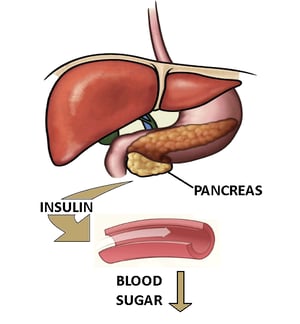The road to chronic disease — from arthritis to heart disease — is paved with sugar and refined carbohydrates. It’s a freeway that leads straight to insulin resistance syndrome, given the right conditions, most notably being overweight and inactive.
carbohydrates. It’s a freeway that leads straight to insulin resistance syndrome, given the right conditions, most notably being overweight and inactive.
The devastating chain of events that leads to chronic disease goes like this:
- Carbs and sugar break down in the digestive tract to glucose that the body uses for energy.
- Beta cells in the pancreas make and secrete insulin into the blood to ferry any glucose you don’t use to muscle, fat, and liver cells for storage.
- Given the right conditions and more glucose than your cells can manage at the moment, the call goes out for even more insulin.
- Beta cells keep the insulin flowing but eventually the body’s cells can’t absorb it or the glucose building up in your blood stream. That’s called insulin resistance.
- Eventually the beta cells can’t keep up and insulin levels plummet. Now your bloodstream is flooded with glucose, which damages nerves and blood vessels, causes inflammation, and leads to a host of chronic diseases.
Chronic Diseases Linked to Insulin Resistance Syndrome
Here’s a short list of what may lay ahead for you if you fail to reverse insulin resistance as soon as possible:
- Heart disease
- High blood pressure
- Prediabetes and diabetes
- Arthritis
- Alzheimer’s disease
- Dementia
- Polycystic Ovarian Syndrome
- Obesity
- Nonalcoholic fatty liver disease
- Pancreatitis
Take the First Exit
The sooner you give those beta cells a rest, the better your chances of avoiding insulin resistance and diabetes. The intervention is simple but not easy if you’ve spent a lifetime eating processed foods and drinking sweet sodas.
Here’s what you’ve got to do:
- Clear your cupboards and fridge of processed foods and those that contain sugar, even if they seem to be “healthy,” like packaged granola, energy bars, and even yogurts with fruit.
- Eat whole, “real” foods — that is, foods made with ingredients you recognize as foods and without pesticides, additives, or any ingredient you can’t pronounce.
- Count your veggies and fruits. Seven to 10 servings a day is currently recommended. A serving is a half cup or, for lettuce and leafy greens, a cup .
- Avoid simple carbs like sugar and white flours and eat complex ones found in high-fiber foods. These digest more slowly and don’t cause a surge in glucose.
- Regular exercise, particularly high intensity interval training, makes muscles more sensitive to insulin. Sleep well, night after night.
- Sleep deprivation has been shown to promote inflammation and obesity.
Always remember one of my mantras., "The more you know about how your body works, the better you can take care of yourself."
For more details about the natural approach I take with my patients, take a look at the book I wrote entitled: Reclaim Your Life; Your Guide To Revealing Your Body's Life-Changing Secrets For Renewed Health. It is available in my office or at Amazon and many other book outlets. If you found value in this article, please use the social sharing icons at the top of this post and please share with those you know who are still suffering with chronic health challenges, despite receiving medical management. Help me reach more people so they may regain their zest for living! Thank you!
ALL THE BEST – DR. KARL R.O.S. JOHNSON, DC – DIGGING DEEPER TO FIND SOLUTIONS
Image attribution:
By Adacik_Nakli_PLoS_Medicine.jpg: Giovanni MakiAtherosclerosis_diagram.gif: NHLBIderivative work: Bobby.OLeary [CC BY-SA 3.0], via Wikimedia Commons


